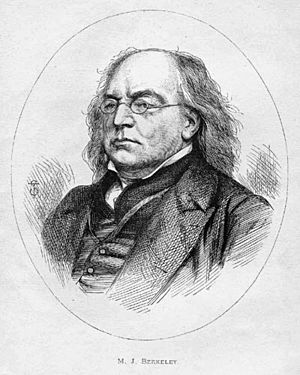Miles Joseph Berkeley facts for kids
Quick facts for kids
Miles Joseph Berkeley
|
|
|---|---|
 |
|
| Born | 1 April 1803 |
| Died | 30 July 1889 (aged 86) |
| Nationality | British |
| Occupation | vicar |
| Known for | Outlines of British Fungology |
| Awards | Royal Medal (1863) |
Miles Joseph Berkeley (born April 1, 1803 – died July 30, 1889) was an English clergyman and a very important scientist. He studied plants without flowers or seeds, like fungi and mosses. He is also known as one of the first people to study plant pathology, which is the science of plant diseases.
Contents
Miles Berkeley's Life and Studies
Miles Berkeley was born at Biggin Hall in Northamptonshire, England. He went to school at Rugby School and then studied at Christ's College, Cambridge. Later, he became a vicar, which is a type of church leader. He worked in churches in Apethorpe and Sibbertoft.
From a young age, Miles loved studying plants that don't have flowers or seeds. These are called cryptogams, and they include things like fungi, mosses, and lichens. He quickly became the top expert in Britain on fungi and plant diseases. Christ's College, where he studied, made him an honorary member in 1883.
Discovering Fungi and Plant Diseases
Miles Berkeley was very famous for studying mycology, which is the science of fungi. He identified about 6,000 different types of fungi! He also wrote important books like Introduction to Cryptogamic Botany (1857). His articles in the Gardener's Chronicle showed he understood a lot about how plants grow and their structures.
He started his work by exploring nature and collecting samples. At first, he studied molluscs and other animals. You can see his early work in journals like the Zoological Journal.
Miles Berkeley was also a skilled microscopist. He made many detailed drawings of tiny algae and fungi. He also carefully studied mosses and liverworts.
Important Discoveries in Plant Health
His research on plant diseases was very important. He studied the potato blight, caused by a fungus-like organism called Phytophthora infestans. He also looked into grape mildew, which he named Oidium Tuckeri.
He investigated diseases affecting wheat, hops, cabbage, pears, coffee, onions, and tomatoes. His work helped people understand how these plant pests lived and spread. This was a huge step forward because very little was known about plant diseases back then. He did all this without modern lab equipment, which makes his discoveries even more amazing.
Founding British Mycology
Miles Berkeley is known as the founder of British mycology. His important works include his descriptions of British fungi in Sir William Jackson Hooker's British Flora (1836). He also wrote Introduction to Cryptogamic Botany (1857) and Outlines of British Fungology (1860).
His collection of plant samples, called a herbarium, is at the Royal Botanic Gardens, Kew. It has over 9,000 specimens, along with his notes and drawings.
Miles Berkeley also worked with Anna Maria Hussey. He helped her identify samples, and she sent him specimens for his collection. In 1857, he became a member of the German Academy of Sciences Leopoldina. In 1879, he was chosen as a Fellow of the Royal Society. He also won the Royal Medal in 1863 for his scientific work.
He passed away at his home in Sibbertoft on July 30, 1889. A genus of fungi, Berkleasmium, is named in his honor. Also, in 1871, another fungus genus, Sarcostroma, had a species named Sarcostroma berkeleyi after him.
Miles Berkeley's Family
Miles Berkeley was the father of Ruth Ellen Berkeley, who was a scientific illustrator. He even named a type of mushroom, Agaricus ruthae (now called Pleurotus ruthae), after her.
See also
- List of mycologists
 | William M. Jackson |
 | Juan E. Gilbert |
 | Neil deGrasse Tyson |

